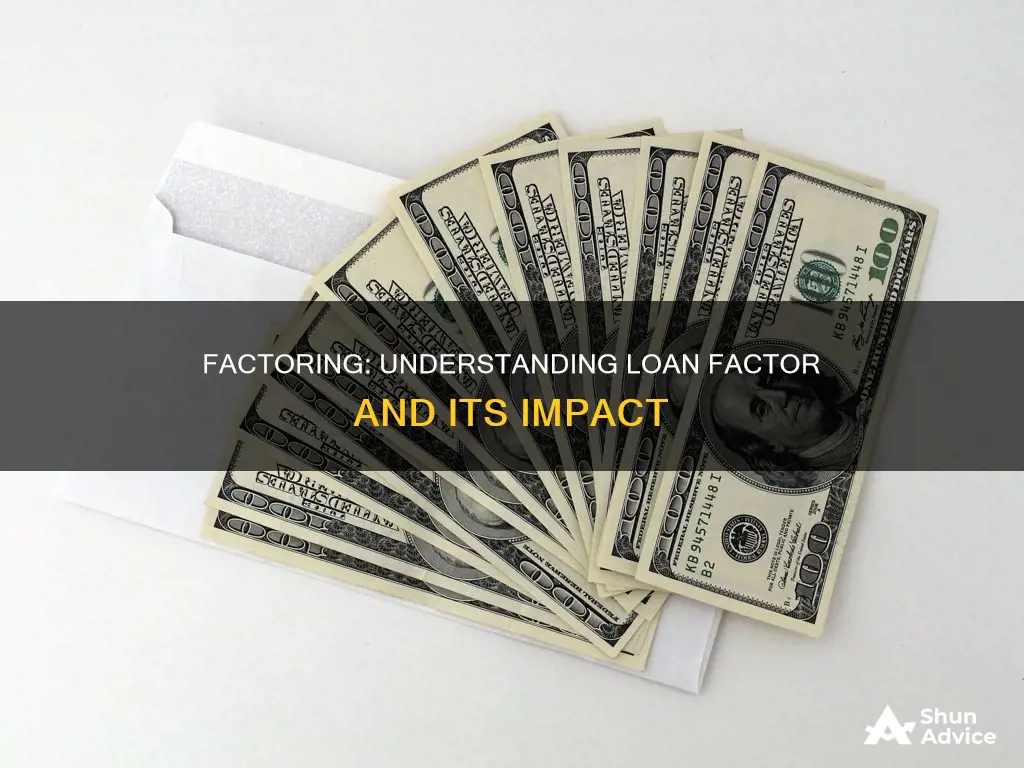
Factoring, also known as accounts receivable financing, is a way for businesses to secure funds by selling their unpaid invoices to a third-party factoring company in exchange for a cash advance. This alternative financing option is often used by small businesses that are unable to qualify for bank loans. While it can be an expensive form of financing, it can help improve a company's short-term cash flow and provide them with the working capital they need to keep growing their business. However, it's important to note that factoring is not considered a loan because there is no lending or borrowing involved, and the funds provided are not subject to any restrictions on their use.
| Characteristics | Values |
|---|---|
| Nature of transaction | Factoring is a sale transaction, not a loan |
| Borrowing | No borrowing is involved in factoring |
| Interest charges | No ongoing interest charges are involved in factoring |
| Transaction speed | Factoring transactions can be completed within a few hours or a few days |
| Application process | Factoring does not involve an extensive application process |
| Rejection rate | Factoring has a lower rejection rate than loans |
| Paperwork | Factoring does not require much paperwork |
| Collateral | Factoring does not require collateral other than the accounts receivable involved in the transaction |
| Cost | Factoring can be more expensive than loans |
| Customer involvement | Factoring requires customer involvement in the process |
| Discount rate | Factoring companies charge a discount rate, which is a percentage of money withheld from the cash advance as a fee |
| Flexibility | Factoring offers greater borrowing flexibility than loans |
| Funding | Factoring can provide immediate funding |
What You'll Learn

Factoring is not a loan
Factoring is often used by businesses looking for a quick cash infusion. It is a good option for businesses that need to improve their cash flow. It is also a good option for businesses that don't have hard assets. Factoring does not require collateral, and companies with poor credit can still qualify.
Factoring is also much quicker and easier to arrange than a bank loan. The application process for a loan can be extensive and time-consuming, and there is a high rejection rate. In contrast, factoring agreements can be arranged quickly and with less hassle. This is because factoring companies are more concerned with whether the customer is creditworthy than with the credit rating of the business itself.
Factoring is also different from a loan in that the customer pays the factoring company, rather than the business collecting payment from the customer and then paying back the loan. This means that the business does not have to worry about making on-time payments.
MPN Student Loans: Who Needs to Fill Them Out?
You may want to see also

Factoring is a quick cash infusion
The process of factoring is straightforward and simple. After choosing a factoring provider, businesses create an account and submit information such as articles of incorporation and business bank details. Once the application is processed, businesses can submit outstanding invoices for funding. The factoring company then reviews and approves the invoices, typically within a short time frame, and transfers the funds to the business's bank account.
The amount advanced by the factoring company is usually between 80% to 90% of the invoice's face value, with the remaining value released once the invoice is paid in full by the customer. The factor charges a fee for their services, which is deducted from the final payment. This fee is typically a percentage of the cash advance, known as a discount rate.
Factoring is a valuable option for small businesses that may not qualify for traditional bank loans due to their credit standards or the requirement for hard assets as collateral. It provides flexibility in working capital as the availability of funds grows with the business's receivables. However, it is important to carefully evaluate the terms and fees associated with factoring to ensure it is a cost-effective solution for the business.
Extended Warranty Coverage: Loaner Vehicles Included?
You may want to see also

Factoring is a sale transaction
Factoring, or accounts receivable financing, is often misunderstood as a loan. However, it is a sale transaction. When a business factors its invoices, it sells those invoices to a third-party factoring company or "factor". The factor purchases the accounts receivable, which is considered a financial asset. This is not a loan because there is no lending or borrowing involved, and no debt is incurred by either party.
In a typical loan scenario, a business borrows money from a bank or lender and repays it with interest. The business carries this debt on its books, and ongoing interest charges can impact cash flow. In contrast, factoring involves the sale of invoices or accounts receivable to a factoring company, which provides immediate cash to the business. The business is then able to utilise this cash to fund operations and improve working capital.
Factoring is particularly useful for small businesses that may not have hard assets or strong credit histories to qualify for traditional bank loans. It provides flexibility and improves cash flow, allowing businesses to take advantage of new opportunities. The process is also relatively quicker and easier than obtaining a loan, as it depends more on the creditworthiness of the business's customers rather than the business itself.
It is important to note that factoring companies charge a fee or discount rate for their services, which can vary depending on the risk of the transaction. This fee is typically a percentage of the money withheld from the cash advance. While factoring can be a valuable tool for businesses, it can also be expensive, and it is essential to carefully consider the costs and choose a reputable factoring company.
Understanding Excess Distribution: Loan Basis Included?
You may want to see also

Factoring is easier to get approved for
Factoring is often easier to get approved for than a traditional bank loan. This is because the approval process is usually much quicker and less strict than the loan approval process. Traditional bank loans can take weeks or even months to complete the application process, and banks tend to be stricter about who is approved. The process involves an in-depth credit analysis, which provides banks with a risk profile of the individual or business seeking the loan. Credit standards are tough to meet, and even established businesses can struggle to get approved.
Factoring, on the other hand, does not require much paperwork and is generally faster and less complicated. This is because the business's credit score is not a priority; instead, the creditworthiness of the business's customers is evaluated. This makes factoring an appealing option for startups, companies in transition or growing, and businesses with poor credit. Factoring agreements can be arranged in a matter of days, especially once the initial account setup is complete.
Another reason factoring is easier to get approved for is that it does not require collateral in the same way that bank loans do. Factoring companies purchase a company's unpaid invoices, advancing 80-90% of the value of each invoice to the company. The remaining funds are unlocked once the customer pays the invoice, minus a small factoring fee. This means that companies with poor credit or limited assets can still qualify for factoring.
While factoring can be a helpful alternative for businesses that cannot qualify for bank loans, it is important to note that it may not always be the best long-term solution. Factoring can be more expensive than bank loans, and it may not offer the same level of financial stability. However, for businesses that need a quick cash infusion, factoring can be an ideal solution to improve cash flow and meet short-term financial needs.
Experian Loans: What You Need to Know
You may want to see also

Factoring is a good option for businesses with poor credit
Invoice factoring is a good option for businesses with poor credit because it is relatively easy to qualify for. Unlike a business loan, which often requires a high credit score and a financial history, invoice factoring companies focus on the creditworthiness of the customers of the business, not the credit profile of the business itself. This makes factoring a feasible option for businesses that struggle to meet traditional financing criteria.
Qualifying for invoice factoring can be straightforward for small businesses, even if they have bad credit or no credit history. To get approved, a business will typically need to provide recent invoices and proof of reliable customers. Instead of a hard credit inquiry on the business or personal credit, a soft credit check may be conducted on the business owner, but the primary assessment is based on the customers' payment histories.
Invoice factoring is a flexible financing option for small businesses that may not qualify for a traditional bank loan or line of credit due to poor credit. Instead of relying on a credit history, factoring allows a business to leverage unpaid invoices to improve cash flow. In this process, the business sells its unpaid invoices to a factoring company, which advances a significant portion of the invoice's value, providing immediate funds to support the business's operations.
Factoring is not a loan, as no collateral is required aside from the accounts receivable involved in the transaction. Funds do not need to be repaid. Instead, the factor provides a cash advance to the business that sold the invoice (typically 80 to 90% of the invoice face value) and works with their customers to collect the invoice payment. Once payment has been collected, the factoring company pays out the remaining invoice value, minus a small factoring fee.
Explicit Costs: Are Loans Included?
You may want to see also
Frequently asked questions
Factoring is an alternative financing option in which a business sells its outstanding invoices to a third-party factoring company (often referred to as a factor) for a discounted rate. The factor provides a cash advance to the business that sold the invoice and works with their customers to collect the invoice payment.
When a business factors its invoices, it sells those invoices to a third-party factoring company. There’s no lending involved in factoring, as funds don't need to be repaid. Bank loans, on the other hand, involve lenders forwarding secured funds to a business that are to be repaid based on the terms of the contract.
A business sells its outstanding receivables, or invoices, to a factoring company in exchange for cash. The factoring company transfers up to 90% of the invoice value to the business. The factoring company follows up with the customer for payment and, when it is received in full, the remaining 10% of the invoice value is transferred to the business less a one-time factoring fee.
Many small business owners are unable to qualify for bank loans due to stringent credit standards, so they must turn to alternative financing options such as invoice factoring. Factoring can be hugely beneficial for small businesses that don't have hard assets but need to improve cash flow. Because factoring doesn't require collateral (aside from the outstanding AR being factored), it can be a saving grace for many business owners.
Factoring can be an expensive form of financing, and the fees can add up over time. The quicker a customer pays, the lower your rates are likely to be with factoring. It's important to do your due diligence to ensure you are partnering with the right factoring company – one that doesn't overcharge you with hidden fees.







